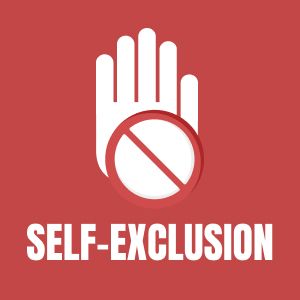Self-Exclusion – How It Works?

As Canada's online gambling continues to grow in popularity, it's essential to be aware of options for self-exclusion. Many casino players apply for the program each year. While going to casinos and other places to gamble may be a fun diversion for some, gambling addiction is still a common reoccurrence. We'll cover the topic of self-exclusion, what it is, and how it works.

If I Apply for Self-Exclusion, Am I Considered a Problem Gambler?
For those who identify as problem gamblers, the self-exclusion program offers support. It’s an option for gamblers concerned that they are gambling more frequently than they should be. Self-exclusion usually is the last option for compulsive gamblers who have exhausted their cash flow and amassed debt. However, self-exclusion does not require a financial disaster before applying.
When you enroll in a self-exclusion program, you agree not to go to any gambling facility. Off-track betting shops, casinos, and racetracks are all examples of this. Self-exclusion programs do not cover illegal or unregistered types of betting.
Who Is Most Likely to Self-Exclude?
Case studies provide insights into the percentage of gamblers who deliberately self-exclude. A recent study investigated problem gambling in Ontario, Canada. The research also included self-exclusion programs.
Gambling legalization has increased the risk of problem gambling in a community by 1-2% of the general population, according to studies. As of 2015, 17,860 Ontarians took part in the voluntary self-exclusion program. Therefore, the population consists of the following subgroups:
- The population of Ontario is 13.6 million people
- The estimated number of potential problem players in Ontario (1.5% of the population of 13.6 million) is 204,000
- Volunteers in Ontario's self-exclusion programmes total about 18,000
Based on these figures, around 9% of prospective problem gamblers prefer to self-exclude. In Ontario, the citizens of the towns with gambling facilities are the most impacted.

How Successful Is Self-Exclusion?
More research would benefit self-exclusion. Yet, the accessible data suggest some general themes. Banning self-exclusion would not be an efficient solution.
The Ontario Lottery and Gaming Corporation (OLG) records show that about 1,500 to 2,000 OLG self-exclusion program members try to access OLG gaming rooms yearly. More than 11% of participants attempt an annual self-exclusion agreement violation. The 11% figure does not reflect the number of people who broke the law but went unpunished. The number of trespasses a volunteer commits before they are detected does not count.
As a result, many trespassing offenses may occur in areas where residents have chosen to self-exclude.

When Is It Necessary to Self-Exclude, and Why?
Several signs indicate that it is time for you to self-exclude, including the following:
- When you bet, you aren't having as much fun as you used to
- Your gambling causes problems with your finances, health, or relationships
- When taking a break would benefit you
- You or those around you experience stress due to gambling. When the impulse to gamble becomes impossible to resist, you realize it's time to make a change
- You have the impression that gambling has "taken over" many aspects of your life and is causing you struggles on multiple levels, including physically, emotionally, and psychologically
- You focus on recovering the money that you have spent
How Is Self-Exclusion Enforced?

Self-exclusion is casino enforced. The Ontario Lottery and Gaming Corporation's (OLG) approach involves facial recognition. In Ontario, self-exclusion requires signing trespassing agreements. Once you are on the casino self-exclusion list, biometric facial recognition technology identifies program members upon entrance in facilities.
Biometric facial recognition systems use the participant's face as a "fingerprint" to identify them. The software scans the person's facial characteristics and, if a match is found, warns the casino security officer of the approaching infringement. The casino's security personnel must then follow the rules and conditions of the self-exclusion program.
How to Cancel Self-Exclusion in Ontario?
After the minimum agreed period of self-exclusion has passed, you are eligible to withdraw from the program. Self-exclusion removal request will then be processed by the respective authority.
- To revoke your self-exclusion, you need to contact the Ontario Problem Gambling Helpline or the responsible authority managing the program.
- The contact information for the Ontario Problem Gambling Helpline is:
- Phone: 1-855-978-7529
- Website: Ontario Lottery and Gaming Corporation
Conclusion
Self-exclusion programs are an essential component of gambling harm reduction. Although they have existed since 1996, very few in-depth studies have been conducted to investigate their effects. Some evidence suggests that self-exclusion programs are typically beneficial for problem gamers by lowering gaming activity.
It is necessary to continue creating more successful self-exclusion programs. It is also essential to examine tailored programs and consider factors such as gender, age, and cultural variations. To ensure a safe gaming experience, check out our best online casino reviews —casinos that rate highly often have proficient, responsible gambling tools, including effective self-exclusion options for players in need.










